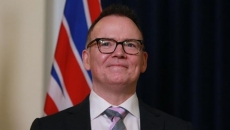A large majority of Canadians agree that higher immigration is fuelling the housing crisis and putting pressure on the health-care system, a new Leger poll suggests.
New federal voting intention numbers from the polling firm also show that the Conservatives are maintaining their sizable lead over the governing Liberals.
The polling, conducted from Friday to Sunday, found that about three-quarters of respondents agreed the increase in immigrants is adding strain to both the housing market and health-care system.
Nearly two-thirds of respondents, or 63 per cent, said the volume of newcomers is also adding pressure to the country's education systems.
But the poll shows that Canadians see some benefits to higher immigration, too.
About three-quarters of respondents agreed that higher immigration contributes to the cultural diversity of the country, and 63 per cent said the arrival of young immigrants contributes to the workforce and tax base, which supports older generations.
Leger polled 1,529 people online. While the results were statistically weighted, they cannot be assigned a margin of error because online polls are not considered truly random samples.
The survey results underline the mixed feelings Canadians have about the effect of immigration on the country.
At the same time, this signals a shift in public sentiment on immigration, as the country grapples with affordability challenges and problems with the delivery of public services.
In 2022, Canada's population grew by more than a million people, a number that included 607,782 non-permanent residents and 437,180 immigrants.
Leger finds that compared to March 2022, the proportion of Canadians who say they want the country to welcome more immigrants than it has the past has fallen from 17 per cent to nine per cent.
On the other hand, more people say Canada should welcome fewer immigrants, with that number rising from 39 per cent to 48 per cent.
Christian Bourque, executive vice-president of Leger, says more Canadians appear to be linking immigration with problems such as housing affordability.
"The makeup of the country, and the issues facing the country, are a bit different than they were before the pandemic," said Bourque.
The federal government has been scrutinized for rapidly increasing its annual immigration targets while the number of temporary residents in the country also explodes.
The number of permanent residents Canada is set to welcome in 2024 and 2025 will increase as planned to 485,000 and 500,000, respectively.
Slightly more than half of respondents to the Leger poll — 53 per cent — said those numbers are too high, while 28 per cent said Canada is poised to admit the right number of immigrants. Four per cent said the country does not welcome enough immigrants.
The federal Liberals have argued that growing the country's population is important to address labour shortages and aging demographics. They've also argued that newcomers can help build the homes that Canadians desperately need.
But following much debate on whether Canada can handle these higher flows of immigration, Immigration Minister Marc Miller tabled new targets in Parliament earlier this month that call for the number of new permanent residents to hold steady at 500,000 in 2026.
Meanwhile, Leger's latest poll on federal voting intentions shows the Conservatives are maintaining a 14-point lead over the Liberals, with 40 per cent of respondents saying they would most likely vote for the Conservatives if an election were held at the time of the polling. Another 26 per cent said they would vote Liberal, and 20 per cent would vote NDP.
Only 29 per cent of respondents said they're very or somewhat satisfied with Prime Minister Justin Trudeau's government, a number that has been declining over the last few months.
A quarter of respondents said Conservative Leader Pierre Poilievre would make the best prime minister, down four percentage points from October. Trudeau trails Poilievre at 19 per cent, while 17 per cent of respondents say NDP Leader Jagmeet Singh would make the best prime minister.
Bourque said the lower support for the leaders, in comparison to that for their parties, suggests the issue of leadership may become more of a focal point in federal politics.
"We're seeing that ... all leaders are underperforming (their parties). Which begs the question: will this all be about leadership moving forward?" he said.






